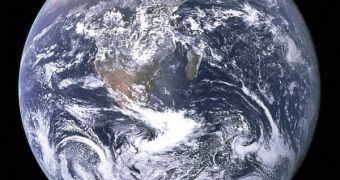In a paper accepted for publication in an upcoming issue of the the Elsevier journal Applied Geochemistry, researchers at the US Geological Survey (USGS) and the University of Virginia (UV) present evidence that the entire planet is becoming more acidic.
The effect is no longer confined to oceans, the team explains, but rather stretches to soils, freshwater, and the air itself. If they stand to scientific scrutiny, such conclusions imply that our planet is slowly, but surely, losing its ability to support the way we're exploiting it.
According to the collaboration, the methods humans use to exploit the planet's natural resources are the leading cause of this general acidification. This is the first-ever comprehensive survey conducted on this topic, the team cautions.
The main conclusion that emerged immediately from the data is that the most polluting industries are also the one whose generate the vast amounts of acid not acting to change the environment on the planet's surface.
These industries include the mining and burning of coal, the mining and processing of metal ores, and the widespread use of nitrogen-based chemicals as principal fertilizers for crop, among many others.
If increased acidity in the world's oceans damages ocean food webs – as past studies have demonstrated clearly – then is it not safe to ask whether the acidification of the air and soils could save equally-negative consequences? What about our own health, when we consume produce from these lands?
Intensive “activities have increased carbon dioxide in the atmosphere, increasing the acidity of oceans; [and] produced acid rain that has increased the acidity of freshwater bodies and soils,” a press release on the USGS website reports.
In addition, the aforementioned industries and processes also “produced drainage from mines that has increased the acidity of freshwater streams and groundwater; and added nitrogen to crop lands that has increased the acidity of soils,” the statement adds.
Under such circumstances, we can no longer expect soils to yield their maximum crop return. However, when crops are not pleasing to farmers, the latter put more nitrogen-based fertilizers in the ground, further contributing to this vicious cycle.
“We believe that this study is the first attempt to assess all of the major human activities that are making Earth more acidic,” explains study leader Karen Rice, a research scientist at the USGS.
“We hope others will use this as a starting point for making scientific and management progress to preserve the atmosphere, waters, and soils that support human life,” she goes on to say.
Further details of the study appear in the Applied Geochemistry paper, which is entitled “Acidification of Earth: An Assessment across Mechanisms and Scales.”

 14 DAY TRIAL //
14 DAY TRIAL //